- Home
- Brian Garfield
Target Manhattan Page 7
Target Manhattan Read online
Page 7
“Minority stockholders had no lever with which to prevent the brothers-in-law from mismanaging Aeroflight, because Mrs. Spaulding had gone into a sanitarium, had signed over controlling authority to Craycroft and Ryterband, and refused every effort by the stockholders to vote her stock against the two men. She seemed quite content to let them do as they pleased. A legal effort to have her declared incompetent failed in the courts.
“The issue was the same one that had faced the brothers-in-law at ACA. The stockholders wanted to change over to the design and manufacture of small jet aircraft. Craycroft, according to pattern, refused. ‘He was demented about that,’ Tree recalls. ‘Really bent out of shape. He refused to let anybody mention the word “jet” in his presence. Some of the rest of us felt the same way, of course, but we didn’t get violent about it. I mean the world changes, you’ve got to be realistic if you’re in business. You go along, or you go under. But Harold didn’t seem to care.’
“The question arises, what was Charles Ryterband’s role in all this? It is evident from the record that Ryterband consistently went along with his brother’s wishes in these matters. (The man tended to refer to Craycroft as ‘my brother,’ rather than as ‘my brother-in-law.’) But it is quite curious how Ryterband invariably agreed with and supported Craycroft, even though anyone can see that Craycroft was the inferior businessman. What vitality one finds in the records of the Craycroft-Ryterband operations are attributable to Craycroft’s engineering genius, yes, but also to Ryterband’s business sense, which, if not superior, was at least average. Yet time after time the brothers-in-law would reach a point of decision; and time after time Craycroft, making the wrong decision, would drag the loyal Ryterband after him down the road of disaster.
“Ryterband was older than Craycroft, far more worldly. He had the normal lexicon of social graces; he had a pleasant personality, a good family life, a normal quota of friends and acquaintances. Business contacts tend to characterize him as having been ‘a little big lightweight, maybe, but certainly not shifty. You could trust him, and his judgment wasn’t too bad most of the time.’
“Yet obviously Ryterband had a blind spot where Craycroft was concerned. Clues to it are scattered; probably the most plausible is found in such observations as this one, again by Richard Tree, interviewed recently at his home in Kansas, where he is now employed by Beechcraft:
“‘Hero worship. Spaulding had it. Ryterband has it, too, for the opposite reason, I think. Spaulding served under Harold in the war, and there’s no question Harold was one of the handful of guys who really contributed something to our winning the war. I mean he was a real legend, to those people who knew. Now, with Ryterband—it’s funny, I never knew him well enough to call him Charlie, but I think I got him figured out all the same—you see, the thing was, Ryterband didn’t serve in the war at all. He got turned down by the draft. Harold went on to become pretty famous among the airmen. Now, that had to have one of two effects on old Charlie Ryterband, didn’t it? I mean either he was going to get jealous and envious and hate his brother-in-law like poison, or he was going to knuckle under and treat Harold with awe. I mean real superman-style awe. And that’s what happened. Mostly because Ryterband wasn’t the kind of guy who hates easy. I rarely heard him ever say a cussword, let alone a nasty remark about any human being. Easygoing as hell, Ryterband. God knows what he had bottled up inside him—maybe he went along with Harold’s wild schemes just because he knew they’d be the ruin of Harold, and he didn’t care if he sank right alongside him as long as he was sure Harold was sinking, too. Maybe. But you’d have to ask a shrink about that. All I know is Ryterband would speak his piece and maybe he’d convince Harold, but if he didn’t convince Harold, then Harold would speak his piece, and that was that. Ryterband was invariably deferential, you know. He never contradicted Harold. Once it was clear Harold had his mind set on something, Ryterband backed him all the way. Always.
“During that same interview, Richard Tree was asked if he recalled the last time he had seen Craycroft.
“‘Sure. It was the day I left Aeroflight. I was just about the last one to go, you know. I stuck it out to the bitter end. I guess I had some of that hero worship myself, if you really want to know. I mean Harold’s—I don’t know, hell, it’s hard to explain. But he’s kind of vulnerable, you know? Kind of fragile. I mean you feel like you want to protect him. You keep rooting for him to prevail, even though you know he hasn’t got an ounce of common sense and he’s doomed to fail. Hell, I was still there two months after they gave out the last paychecks.’
“Asked when that was, Tree replied, ‘March of this year. When I left, I mean. The last paycheck was December’s. I finally had to feed my family, you know, so I got this job offer here and I came on out. But I didn’t really want to. It’s hard to put into words. Harold kind of creates this atmosphere around him, you know? It’s esprit de corps, something like that.
“‘It was like, hell, you know, it was like he was the coach and we were the football team and we’d lost every game the past two seasons because he was still using the old T formation and all the other teams had gone light-years ahead of that, but we went right on loving the old coach and playing the game his way. It was like that.’
“‘What happened to them after you left?’ the interviewer asked.’ Do you know?’
‘“I heard things. I’m not sure how true some of them are. I heard he ended up moving into the Aeroflight offices. Living there, I mean. He gave up his house, of course. He didn’t have much equity in it but he sold it and used the few bucks from the sale to pay some of the creditors or something. I mean Harold wasn’t a shyster. He always meant to pay his debts. He’d been bankrupt a couple times before, I understand—him or maybe his corporations, I don’t know which. But he’d felt demeaned by it, I know that. He hated the idea it was happening to him again. He scraped together everything he could, but it just wasn’t nearly enough. He ended up, I hear, living in the hangar. Sleeping in a bedroll on an army cot under the wing of one of those crazy old Flying Fortresses of his. The one they’d finished converting, with the pressurization and the new instruments and all. That was the only one they rebuilt before the shit hit the fan. Harold used it for a demonstrater, showing it off to potential buyers when they showed up. But nobody ever placed an order for it. I mean nobody wants those old crates anymore. Hell, they’re antiques. The only guy in the world who can still fix them up is Harold. What happens if you’re flying over the Sahara in one of those things and you need a quick tune-up? Nobody knows how anymore. It’s like antique foreign cars. They may be fun, but you can’t use them commercially. That was what Harold couldn’t see. He kept saying they were still the best goddamned four-engine planes ever built, those B-17s. Shit, yes, they were, there’s no question of it. But, for Christ’s sake, that old plane was thirty-two years old!
“‘Anyway that’s the last I heard of him. He was barricaded out there. When the lawyers came around to talk foreclosure, they got locked out. He wouldn’t let them in. I heard rumors he had a shotgun, he was threatening to shoot anybody that tried to break in.
“‘That’s the last I ever heard of old Harold. Until now, of course.’”
Harris (Cont’d)
Now, you’ve stated that you were a passenger in the Port Authority helicopter when the pilot received orders to examine Craycroft’s bomber at close range. What time did you make the initial study of the plane?
Must have been around twelve forty, twelve forty-five. I know we landed at one o’clock. It must have been maybe fifteen, twenty minutes before that when we made our pass at him. As I said, we got a good look at the plane. We could see there was only one man in the cockpit compartment. We couldn’t distinguish his features, of course. At least I couldn’t. I took some film of the plane.
Was that ordinary cinema film?
No. It was teletape—TV tape.
So I was told. Now, when you hovered over lower Manhattan to have a close look at the bomber, did
Craycroft show any reaction to your surveillance?
I guess he did.
You guess?
I didn’t think he did it out of reaction to us. Not at the time. There was no obvious connection. But afterward, I realized, he was reacting to the threat we implied.
Can you explain that? What did he do, exactly?
He opened the bomb-bay doors. I got film of it. He was in the middle of his turn, vectoring north.
After that he left them open, didn’t he?
Yes. And that’s quite a feat, you know. The airplane gets harder to control with the doors open like that. You’ve got drafts in the bomb bay.
I see. Now, did anything else happen that struck your attention at that time?
No. He continued on the same circuit he’d been flying before. Up toward the northern end of Central Park, then a tight U-turn over the wide part of Manhattan and back south along the west side. Looking at him from below, he was making a clockwise circle.
How long did you remain hovering there?
Maybe five, six minutes. He hadn’t finished that circuit when we got orders to land and report in. The pilot did, that is. I was just along for the ride, as I said, trying to get news footage of the highway job.
Where did you land, and when?
One o’clock. I made a note of it. I was making a lot of notes. I mean you don’t see a bomber at treetop level opening its bomb-bay doors over Manhattan every day. With bombs in the racks.
You saw the bombs?
They looked like bombs to me. I remember thinking, if it’s a publicity stunt for that movie, it’s a hell of a realistic one. Whatever was happening, it was a news story—and I was right on top of it with teletape close-ups. I figured I had a hell of a beat. Anyway—you asked—we landed at the Wall Street heliport There were two uniformed cops and two plainclothes FBI agents waiting for us. I wanted to get to a phone, but they vetoed that. I got a little angry and they had to convince me.
How did they do that?
They told me those were real bombs he had in that airplane. That’s enough to shut anybody up, wouldn’t you say?
What happened next?
One of the agents asked me if I had film in the camera and I told him it wasn’t film, it was tape. We got it established that I had shots of the plane from close-up. He put in a call from his car radio for a teletape reader. That’s a portable playback machine with a small screen. Like a film editor’s moviola. Only with TV tape you get instant playback, of course, since you don’t have to develop the film.
That was quite a stroke of luck.
Sure. But we couldn’t see any way to take advantage of it. I mean, we had it, but what good was it? So we had close-up pictures of the airplane and the open doors and even a couple of oblique shots of the bombs glistening inside there. But that didn’t change anything.
You accompanied the officers and the helicopter pilot to the Merchants Trust Bank, did you?
Yes. Mostly because they’d ordered the teletape reader sent over there. They figured I could do narration while they were looking at the pictures. I mean, Woods and I were the only ones who’d been up there close to him.
What time did you arrive at the bank?
We got up to Maitland’s office around one fifteen. It took about twenty minutes more before the reader showed up. The place was pretty crowded by then—a lot of official types milling around. They had Ryterband stuck in a corner behind a barricade of chairs. The old guy looked confused but stubborn. He wasn’t giving an inch. In a strange way I got to admire him a little in the next hour or two. He had a lot of balls, you had to give him that.
Who appeared to be in charge?
That’d be a matter of opinion. In Azzard’s opinion—he’s the FBI muckamuck—
I know.
In Azzard’s opinion he was in charge. There was a police captain, fellow named Grofeld—damn nice guy, incidentally, not your stereotype beefy cop—he was there, too. He wasn’t running around asserting himself the way the FBI clowns were, but I think you could say if anybody in the room had a semblance of real control, it would be Grofeld. Him and a police sergeant named Billy O’Brien. I’ve known O’Brien off and on for three, four years. He’s one of the best. Quick, practical, brainy—a real take-charge guy. Between him and Grofeld the FBI was left standing in the chocks, if you want my honest opinion.
I do, Mr. Harris, very much. I appreciate your candor.
The rest of them have to cover their asses, Mr. Skinner. I’ve got no boss to brownnose. I’m free to speak my piece. The rest of them may not have it that easy. I’m not taking any kudos—it’s just the position I happen to be in. If I was a civil servant like those poor bastards, I might get a little canny and close-mouthed, too. Or try to pass the buck.
Do you think the buck requires passing, Mr. Harris?
Well, there were goof-ups here and there.
Can you name some?
There was one that could have been pretty hairy. One of the FBI boys had a bright idea. He almost talked Azzard into it.
What was that?
Get some artillery up on a roof somewhere and shoot him down.
You’re kidding.
I was standing right there. I remember I just gave Azzard a pained look. But, so help me, he was taking the clown seriously. How could you figure he’d buy that one? We’d all heard Ryterband, over there in the corner muttering about how those bombs were armed. And here Azzard was seriously thinking about shooting him down.
What happened?
I said a few words. I said, “For Christ’s sake he’s got armed bombs in that airplane.” I mean, you shoot him down, he crashes in Manhattan, you lose six or eight city blocks. Eight thousand pounds of high explosive?
I’m not familiar with the expression “armed bombs.” Is there such a thing as an unarmed bomb?
Sure.
Can you clarify it for me?
Well, there are all kinds of high explosives. But most of them are fairly stable chemicals until they’re ignited by a detonation device. You can play baseball with a normal blasting stick. But if you stick a fuse in it and throw an electric charge into the fuse, then it’ll blow up. You follow? Normally a high-explosive compound won’t explode from simple impact. There has to be a detonation device. Electric, heat, or impact. There are various kinds. With old-fashioned aerial bombs, the usual detonator was an impact device—a pin in the nose of the bomb, like a firing pin, designed to explode a capsule of fulminate-of-mercury, which in turn ignites the main explosive. If you block off that firing pin, the bomb is disarmed—it won’t blow up as a result of an impact. You could drop a disarmed bomb from ten thousand feet and all you’d get would be a dull thud and a little dent in the ground, if the detonator wasn’t armed. The point is, nobody in a bomber wants his whole plane to blow sky-high if his bomb bay happens to get hit by a stray machine-gun bullet from an enemy fighter. You follow? So ordinarily you only pull the switch that arms the warheads when you’re ready to drop them out of the plane. That’s normal safety procedure. Usually the disarming device is simply a metal plate wedged between the firing pin and the detonator. Pull that plate out, and it arms the bomb. But as long as the plate remains in place, the bomb won’t explode.
But the bombs in Craycroft’s plane were armed?
Ryterband said they were. If we believed the rest of his story, we sure as hell had to believe that part, didn’t we? That seemed the whole point of Ryterband’s caterwauling—to make damn sure we knew those bombs were armed.
What did Azzard say when you pointed this out to him?
Not much of anything that I can remember. He was a little miffed. I don’t think he wanted to believe me. But there were a couple of guys from the police bomb squad hanging around, and they agreed with what I told him.
To your knowledge, what was being done at this time to meet the demands of Craycroft and Ryterband?
I was just a spectator, of course. I didn’t hear or see a lot of what was going on. I think they had some
body trying to get the money up. Maitland, the banker, kept getting on the phone with his people.
Was anybody speculating as to whether the money could be got up in time?
Sure. Everybody was.
Where was the emphasis, would you say? On trying to stop Craycroft or on raising the money to pay him off?
I’d have to say both. Everybody was concerned about both. It was Hobson’s choice.
Valkenburg (Cont’d)
Did the Federal Reserve Bank respond with alacrity to your approach?
I don’t know if you could say that.
What could you say?
They got stricken with a damn near terminal case of bureaucracy over there. They always do if there’s anything that smells like a crisis.
And?
I got put on hold.
And then?
In the first place they couldn’t seem to find anybody that was willing to admit he was authorized to talk to anyone about anything. It was about ten after twelve when I made the call, and they’re all civil servants down there. Ergo they were all out to lunch.
And in the second place?
Well, look, in a nutshell what it came down to was this: The federal government gives money away all the time, but they do it after there’s been a Congressional appropriation and a policy authorization from some Cabinet agency, right? Now here we’re talking about five million dollars in cash, and the Fed is the only place in town that happens to stock that particular model, and what it boiled down to was that they didn’t have signatures in quintuplicate authorizing the release of said item.
What did you do about it?
Me? I’m a vice-president of a private bank. I don’t swing much weight at the Fed. I knew one guy down there, I play handball with him, he’s a deputy administrator in the disposal office. But he was out to lunch. The rest of them heard my story, suddenly they no spick English. At first they wouldn’t even tell me where my friend was having lunch. Finally I got the name of the restaurant and put through a call. He came on the line and listened to my yarn and then he just breathed hard for a few minutes. I didn’t want to interrupt that. Then he said he’d run straight back to his office and call me back from there.

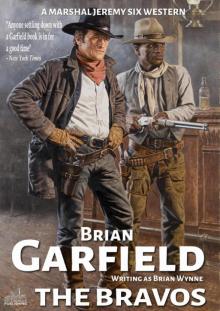 Marshal Jeremy Six #3
Marshal Jeremy Six #3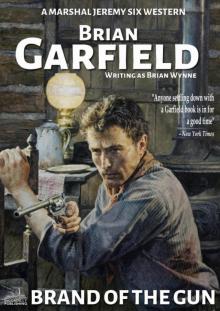 Marshal Jeremy Six #6
Marshal Jeremy Six #6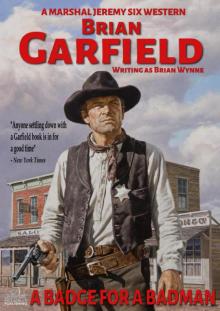 Marshal Jeremy Six #5
Marshal Jeremy Six #5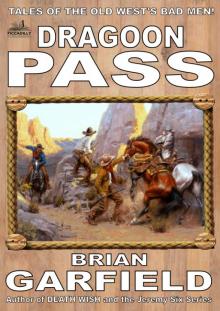 The Outlaws 2
The Outlaws 2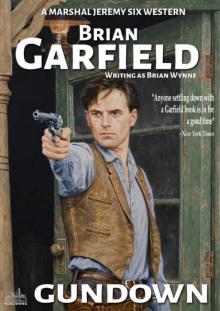 Marshal Jeremy Six #7
Marshal Jeremy Six #7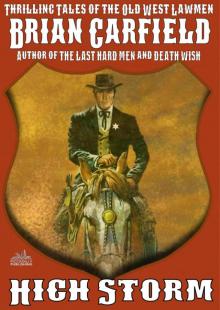 The Lawbringers 4
The Lawbringers 4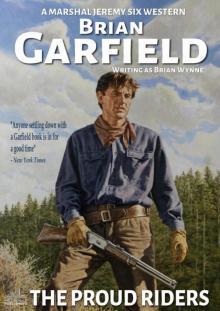 Marshal Jeremy Six #4 the Proud Riders
Marshal Jeremy Six #4 the Proud Riders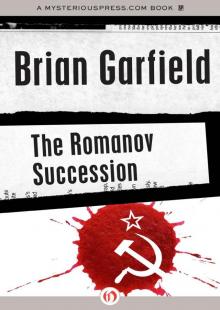 The Romanov succession
The Romanov succession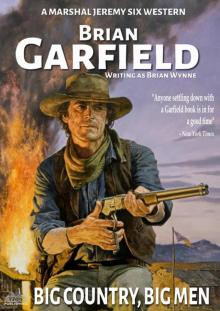 Marshal Jeremy Six #8
Marshal Jeremy Six #8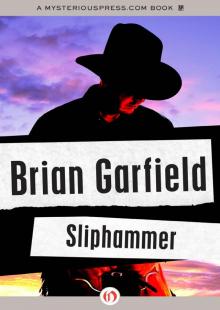 Sliphammer
Sliphammer Line of Succession
Line of Succession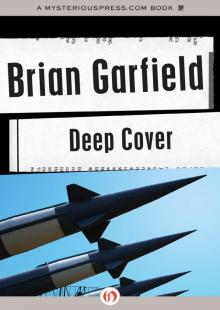 Deep Cover
Deep Cover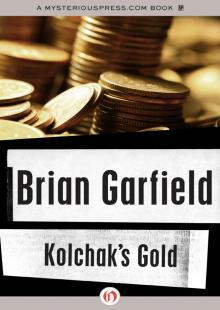 Kolchak's Gold
Kolchak's Gold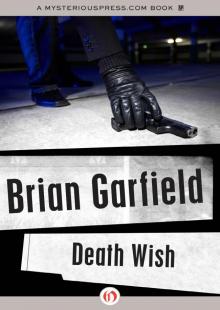 Death Wish
Death Wish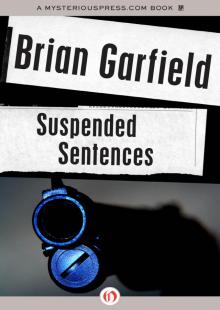 Suspended Sentences
Suspended Sentences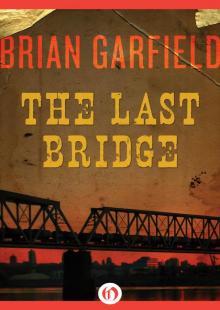 The Last Bridge
The Last Bridge Relentless
Relentless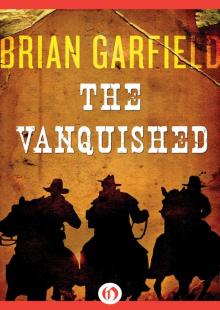 The Vanquished
The Vanquished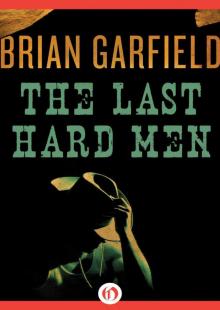 The Last Hard Men
The Last Hard Men Hit and The Marksman
Hit and The Marksman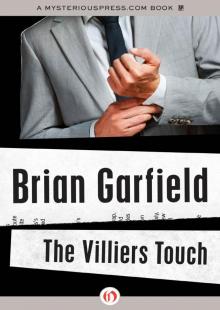 Villiers Touch
Villiers Touch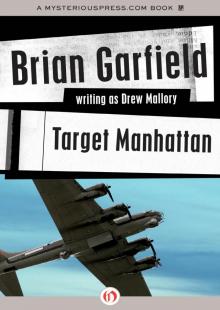 Target Manhattan
Target Manhattan Marchand Woman
Marchand Woman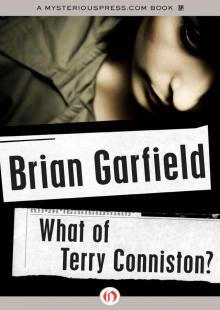 What of Terry Conniston?
What of Terry Conniston?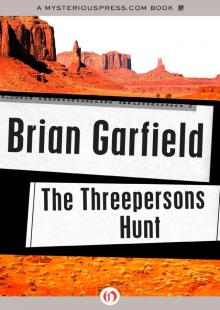 Threepersons Hunt
Threepersons Hunt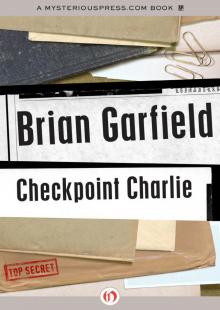 Checkpoint Charlie
Checkpoint Charlie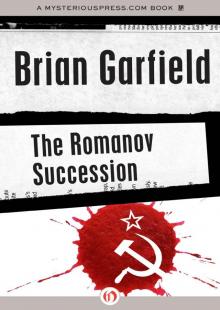 Romanov Succession
Romanov Succession Necessity
Necessity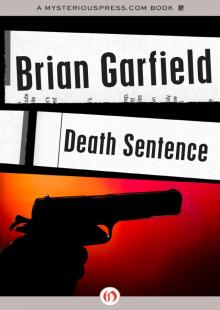 Death Sentence
Death Sentence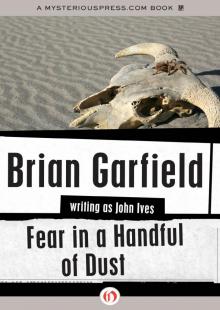 Fear in a Handful of Dust
Fear in a Handful of Dust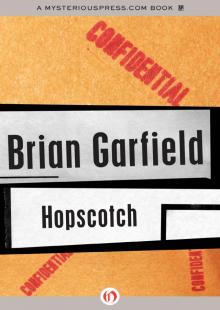 Hopscotch
Hopscotch